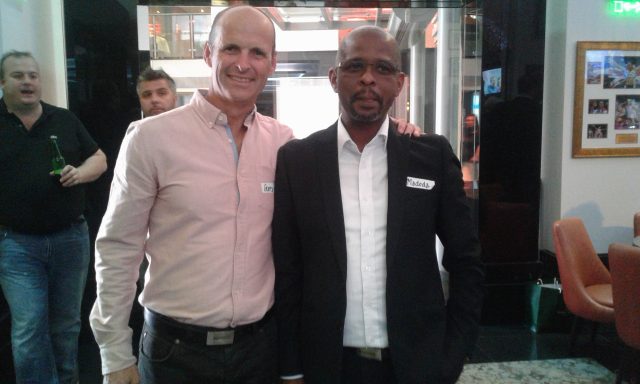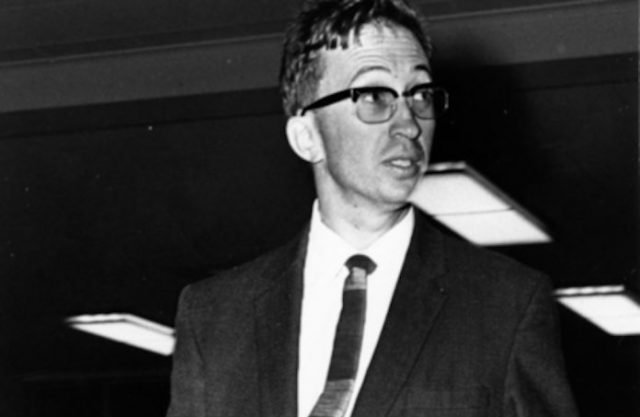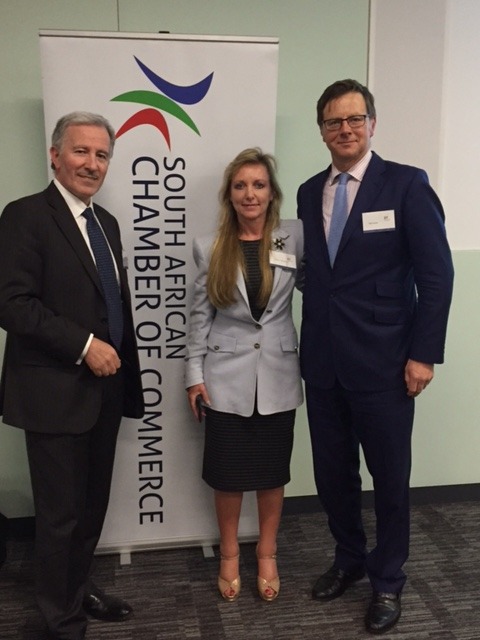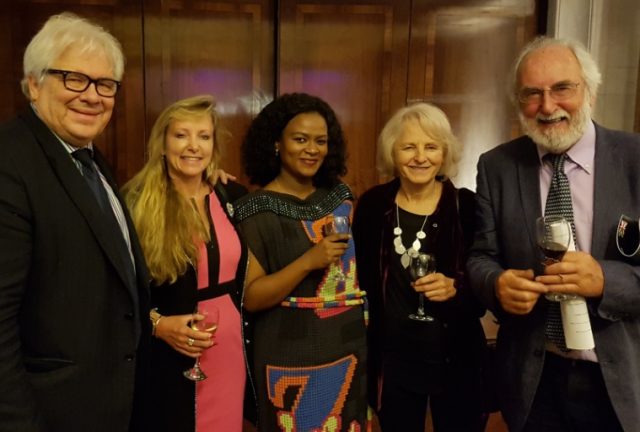By John Battersby – June 29, 2017
By 1963, the levels of repression had become life-threatening for black South Africans subjected to ruthless repression and curfews and the handful of white South Africans who opposed the system were losing hope that it would change in their lifetimes.
It was against this background that Joel decided to emigrate to Australia and try to start a new life.
He was well advanced with his plans to leave when a police raid on 11th July 1963 on a house in the leafy Johannesburg suburb of Rivonia changed everything.
Nelson Mandela’s ANC colleagues – including Govan Mbeki, Walter Sisulu, Andrew Mlangeni, Ahmed Kathrada and Dennis Goldberg – were arrested and charged with plotting the overthrow of the apartheid government. Mandela was already serving a sentence on Robben Island and was indicted along with the rest.
Joel was approached initially by Hilda Bernstein to defend her husband, Rusty Bernstein, who was one of those arrested, and later he was asked by Mandela’s then wife, Winnie, to defend her husband. The die was cast. He agreed and his plans to emigrate were put on hold.
The decision changed his life and the trial changed the course of South African history and laid the foundation for the democratic order.
In January this year, I asked Joel at short notice to join a panel for a Memories of Mandela event at the British Museum.
His account of the trial had the large audience riveted. It was as though he was reliving the event which happened 64 years ago. His wife Vanetta, who was sitting in the front row and had heard the story many times before, was overcome with emotion.
“Joel was magisterial,” said Sir Nick Stadlen, a retired High Court Judge and a close friend who had become immersed in the Rivonia trial. “The best I have ever heard him.”
In preparation for the Rivonia trial, Joel, the instructing attorney, had assembled a formidable legal team headed by his revered colleague and friend Bram Fischer, an advocate from a distinguished Afrikaner family who turned against the apartheid system to become an underground activist for the South African Communist Party.
At the British Museum event, Joel related his first meeting with Mandela in October 1963 in the interview room at Pretoria jail accompanied by Fischer, George Bizos and Arthur Chaskalson who went on to become Chief Justice in the democratic South Africa.
Mandela arrived after the other defendants as he had to be flown from Robben Island where he was already serving another sentence.
“Ten minutes into the consultation the door of the interview room was suddenly flung open and Nelson Mandela strode into the room.
“Unlike the lawyers clothed in suits and the other prisoners who wore their awaiting-trial clothes, Mandela was clad in South African regulation prison garb for black prisoners – short trousers, open-toed, ill-made sandals and an open-necked khaki shirt.”
“He looked hollow-cheeked and had lost a great deal of weight.”
Joel went on to explain how the strategy of the legal team, which was trying to prevent the imposition of the death penalty, and that of the defendants, which was to prove that they were morally correct, did not always coincide.
When Mandela wanted to announce in his statement from the dock that he was prepared to die for his belief in a non-racial and democratic South Africa, Joel tried to dissuade him from such a course as death by hanging would be almost inevitable if they were found guilty as charged under the Sabotage Act of trying to overthrow the state by violent revolution.
“I could not bear the thought of Mandela being hanged and decided that on the re-typed version I would leave out the ‘prepared to die’ sentence and handed the re-typed speech back to Mandela.”
The next day Joel received a hand-written note from Mandela asking for the sentence he had omitted to be restored with the addition of the words “if needs be” to qualify the commitment that he was prepared to die for the ideal of a non-racial democracy in South Africa.
What Joel did not realise at the time was that his fellow lawyer George Bizos had spent the following evening persuading Mandela to agree to the “if needs be” qualification.
Joel recalled the hushed silence before Mandela uttered his final sentence following a three-and-a-half hour speech to a packed courtroom. A further hushed silence followed.
Mandela and his colleagues were spared the death sentence and Joel and his wife were had won wide admiration in the black community but not made many new white friends.
They had their passports confiscated and were effectively deported on one-way tickets.
After being declared undesirable by the Australian authorities in the wake of the Rivonia trial they headed to the United Kingdom to make their new home.
Joel eventually teamed up with colleagues from his student days in Johannesburg, Sir Mark Weinberg and later Sir Sydney Lipworth to form Hambro Life Assurance which became Allied Dunbar, a highly successful life assurance venture which made Joel a fortune.
It also gave him the opportunity to launch his passion for charitable giving, pioneering one of the earliest initiatives in corporate giving with the Allied Dunbar Trust which supported causes such as mental illness which received limited funds at that stage.
Joel was twice chairman of Oxfam and served the organisation in various capacities over two decades (1980 to 2001).
Around the same period, Joel became the leading philanthropist for UK-registered South African causes.
He was for a decade the chair of the Canon Collins Educational Trust of Southern Africa (CCETSA) which awards more than 100 scholarships annually to development-oriented post-graduate students in southern Africa. Many of the Canon Collins graduates went on to become Ministers and leaders in the post-apartheid government and institutions of the new democracy.
The Canon Collins Trust emerged from the South African Defence and Aid Fund – and its sister organisation, the British Defence and Aid Fund – founded by the late Canon John Collins of St Pauls Cathedral.
Defence and Aid played a lead role in funding the defence of anti-apartheid activists convicted under South Africa’s anti-communist and anti-terrorist laws over three decades to the tune of some GBP 100-million over 30 years and it was to them that Joel turned for funding for the defence at the Rivonia trial.
In 2012, Joel engineered the merger of the Canon Collins Trust with the Legal Assistance Trust (LAT} to form the Canon Collins Educational and Legal Assistance Trust (CCELAT) which was the fund-raising arm for the Legal Resources Centre in South Africa, one of the organisations credited with rolling back the frontiers of apartheid law.
Joel was for several decades the lead funder of both organisations – CCEELAT and LAT – and it is estimated that he gave away two-thirds of his fortune to charitable causes during his lifetime either directly or via the Joffe Charitable Trust which made grants to a host of human rights organisations in South Africa.
(I became a trustee of the LAT in 2007 and a trustee of the merged charity in 2012. I have been chair of trustees of CCELAT since 2015.)
Joel Goodman Joffe was born in Johannesburg of Jewish immigrant parents who had met and married in South Africa. His father, Abraham “Arthur” Joffe was from Latvia and his mother, Dena (nee Idelson) was from what was then known as Palestine.
The young Joel had a streak of the rebel in him from an early age. His grandfather founded the Reform Jewish Congregation in South Africa and he was required to go regularly to Synagogue until his Barmitzvah at the age of 13 and then never did so again.
He came from a musical family but when his godmother took him away to teach him to sing she found to her dismay that he was tone deaf and could not hold the tune of the song. So her attempts to get him to sing the Jewish song Hava Nagila fell flat, he told the BBC’s Desert Island Discs.
Despite his claim to being tone deaf, Joel appreciated a wide range of music on his “desert island” ranging from Beethoven’s violin concerto through Joan Baez’s There But for Fortune and We Shall Overcome to My Fair Lady. But his favourite disc was Richard Burton reading Dylan Thomas’ Under Milkwood.
He said that the books he would take to the island with him were the Bible and the autobiography of Nelson Mandela. His chosen disc was Under Milkwood and he would take a wind-up radio to listen to the BBC World Service including Desert Island Discs.
Joel’s parents sent him to a Catholic boarding school from the age of nine. He had an “uneventful” childhood and had a limited understanding of the racial injustice going on around him.
He reacted against “irrational discipline” at school and was frequently beaten when he did not fall in line.
He studied law at the University of the Witwatersrand in Johannesburg and was called to the South African Bar in 1962. While working for a commercial law firm he built up a legal aid practice without the partners knowing.
When his seniors objected to his clandestine pro bono work he left and moved to the practice of James Kantor and his brother-in-law Harold Wolpe who was arrested shortly after the Rivonia raid and later escaped and went to Britain.
The police were incensed and, in an act of revenge, arrested James Kantor under the same 90-day detention law while knowing that he was not involved in the conspiracy.
It fell on Joel to wind up the practice and while he was doing so several relatives of the accused came to see him. Ironically, the two lawyers who could have defended those arrested at Rivonia had both been taken out of circulation.
It was also in 1962 that Joel married Vanetta Pretorius, an artist who had helped him with his Afrikaans for court cases.
Joel is survived by Vanetta and their three daughters, Lisa, Abigail and Deborah and four grandchildren. Vanetta was always at Joel’s side in his latter years and they received a constant stream of guests in their charming and welcoming 16th century home, Liddington Manor, home of the original Lord of the Manor in the Wiltshire hamlet of Liddington close to Swindon.
A couple of months before he died, Joel called his friend Sir Nick Stadlen, a retired High Court Judge, to donate a generous sum to a charity called Life is Wonderful which was formed to celebrate the values of the Rivonia generation and create digital platforms to make their stories and values more accessible to a younger generation.
(I am also one of two trustees of Life is Wonderful. Joel was the third.)
Stadlen has spent much of the past five years researching, interviewing and writing about the Rivonia trial for a book and a documentary.
He will focus in particular on the role of Bram Fischer, the leader of the Rivonia legal team who Joel praised and supported throughout his life inter alia by financing the biography of Fischer by Stephen Clingman and funding a series of lectures in Fischer’s name at Oxford University.
By various accounts, Bram Fischer was devoted to Joel and once described him as the closest human being to Jesus Christ that he had ever met.
Stadlen and Joel were interviewed by Matthew Parris on BBC Great Lives together in 2015 to discuss the life of Bram Fischer.
Along with long with Dennis and Laura Marcus, Joel and Stadlen played key roles in the celebration of the lives of the three surviving Rivonia defendants – Ahmed Kathrada, who has since died, Dennis Goldberg and Andrew Mlangeni who was unable to attend the gala dinner for 750 at a London Hotel in January 2016.
The event was called Life is Wonderful after a courtroom comment by Goldberg when he and his Rivonia colleagues learned that they had not been sentenced to death.
“Life….life is wonderful,” Goldberg proclaimed on hearing the judge’s verdict.
The Rivonia trio and George Bizos, the other surviving member of the legal team, also received the Freedom of the City of London at a ceremony at Guildhall and met with then-Prime Minister David Cameron in Downing Street. Joel was visibly delighted with the event and being reunited with his Rivonia colleagues.
Lord Peter Hain, a leading anti-apartheid activist and now a Labour Peer described Joel as an “iconic figure” who never sought the limelight.
“He just supported everyone else,” said Hain. “He was a totally generous person….warm, passionate and he continued to fly the flag for the anti-apartheid struggle and subsequently for the new South Africa.
In his later years, Joel was much encouraged by the surge of international interest in the Rivonia trial in general and in Bram Fischer in particular. Several documentaries and a feature film on the trial and a major feature film on Fischer are either in the pipeline or in production.
Joel also became one of the leading advocates of assisted dying in the UK by actively campaigning for everyone to a dignified death.
He said he was motivated by a strong belief in personal autonomy and that being able to die a dignified death was a human rights issue.
In 2002, he tabled a private member’s bill in the House of Lords which sought relief for those experiencing intense suffering by being able to request medical assistance to die provided they were of sound mind. The bill stirred vigorous debate amongst the medical profession, politicians and organised religions but it did not pass.
He re-introduced the Bill in the House of Lords on at least four occasions and, while it gained broader support at Westminster and much support in the public arena, it was never passed into law.
Like Mandela, Joel had an indelible impact on the lives of all those he came into contact with. He put the lives of others first and he was only at peace with himself when he was serving others. He was magnanimous and passionate, humble on occasions to the point of being self-effacing.
In the forward to Joel’s book on the Rivonia trial (The State vs Nelson Mandela: The Trial that Changed South Africa) Mandela described Joel as “the general behind-the-scenes in our defence”.



















